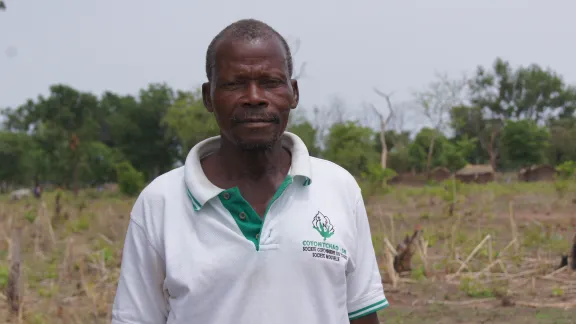
Daniel Deba, president of the Dosseye seed production cooperative. Photo: LWF/ C. Kästner
An abundant stock of their own grain
DOSSEYE, Chad/ GENEVA, 19 June 2015 (LWI) - “A civil servant buys what he needs in a market. A farmer has it at home,” Daniel Deba, President of the seed production group quotes a proverb he learned from his father. He never thought it would become as essential as it is now, though. Ten years ago Deba had to leave his job as a Biology professor in the Central African Republic (CAR) and fled to Chad. In the past ten years, he and his family of 14 have built a new life in Dosseye refugee settlement.
It isn’t easy to find a place to sit and talk. Heavy rains have left small lakes and big puddles all throughout the settlement, and turned some of the fields into muddy swamps. All around, people are plowing and planting. “We like the soil this way,” Deba says. “This is life.”
Deba is the president of the local seed production group, an agricultural enterprise set up and supported by The Lutheran World Federation (LWF). He himself runs a micro project for seed production with 12 acres of land. The group consists of more than 100 producers like him, who multiply seeds. Together, they store the grain until it is the best time to sell.
More professional approach
LWF provided the group with oxen and plows, a starting set of seeds and a warehouse. Now the group has three warehouses and an abundant stock of their own grain. “We buy the seeds in a farm, multiply them and re-sell at a higher price,” Deba says. With 35 different types of seeds, the group makes good business in the region. “We have up to 98 percent return on investment on sorghum, and 89 percent on peanuts,” Deba proudly says. “LWF helped us with a more specialized, professional approach.”
The president knows what he is talking about. A professor of biology, he was head of a school near the Chadian border in CAR. Deba used to teach about livestock before the conflict forced him to leave his home but has also always farmed a small field. “I learned that from my father, now I can use it,” he says.
When militia in CAR began targeting civil servants, who were seen as part of the government the rebels meant to overthrow, Deba had to leave. “Armed men came to my school and asked me where they would find the head teacher. They didn’t know me, so I pretended to be someone else and fled,” he recalls. His wife took the children and went with him, across the border, to safety. That was ten years ago. The family was not able to return since.
Peace and education
By now, the oldest of Deba’s 12 children are married, two attend university and two have graduated and want to start higher education. His youngest daughter just started middle school: she lives with her older siblings in nearby Gore to attend a better school than is available in the settlement. Deba uses the money from the seed production project for his children’s education. “There are no scholarships, and putting four children through university is difficult,” he says.
Asked about his vision of the future, Deba is divided. He loved his job as a professor, but also enjoys working as a farmer and entrepreneur. At the present, his children’s needs are most important: The money from the grain multiplication is necessary to put them through school. For the future however, Deba hopes for a longer term solution. His family was among those destined to be re-settled by the authorities, but the last time he heard about it was four years ago.
“Of course I want to go home,” he says, “but that is not possible. Now I prefer to be resettled, so my children can get a good education and live in a peaceful country.”


